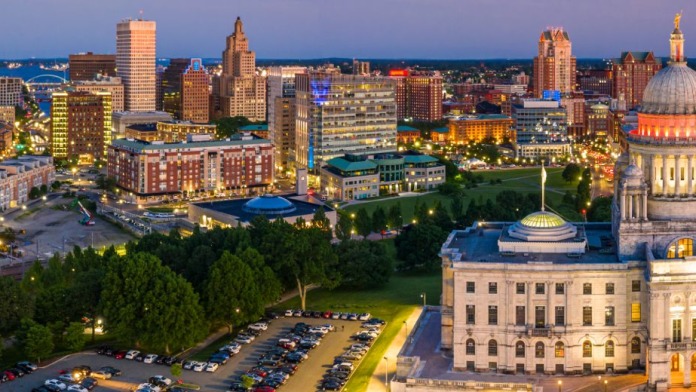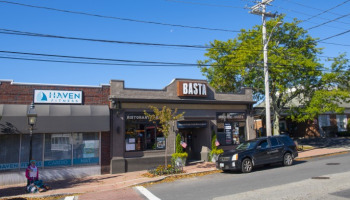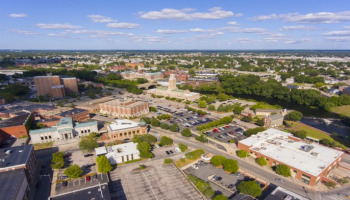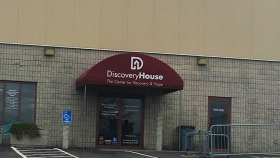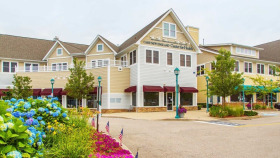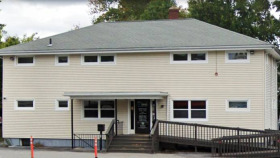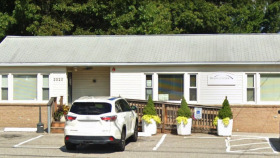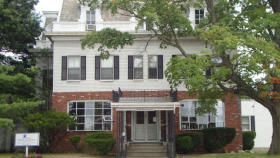Expert Insights
My work in substance abuse recovery services in Rhode Island as a mental health counselor has shown me firsthand addiction’s devastating grip. I’ve never met anyone who chose to become addicted. Dependence usually sneaks in subtly, as personal problems escalate without warning, and withdrawal fears, stigma, and treatment barriers become obstacles on the way to healing.
According to the Rhode Island Department of Health, 404 Rhode Islanders lost their lives to drug overdoses in 2023. Recently, the state pioneered overdose prevention centers to reduce harm, a much-needed initiative.
While it’s too early to draw absolute conclusions, people using these centers are to enter treatment, up to 30%, as reported by WebER Renew. We must continue meeting people where they are to facilitate recovery.
~ Serg Valencia, MD, MS
How Much Does Drug Rehab Cost in Rhode Island?
Rhode Island is ranked 41st nationwide in terms of addiction treatment affordability, with an average cost of drug and alcohol rehab of $58,755 (without insurance).
- Medical detox is the most expensive, with an average cost of $144,853
- Long-term inpatient drug rehab in Rhode Island costs an average of $51,848
- Outpatient addiction treatment in Rhode Island costs an average of $8,615
- Outpatient methadone treatment is the most affordable, with an average cost of $7,655
 Since there is no one-size-fits-all rehab program, the cost of a drug or alcohol rehab in Rhode Island also varies based on the program you choose. Inpatient is typically more expensive than outpatient treatment, and the longer the program, the more it will cost.
Since there is no one-size-fits-all rehab program, the cost of a drug or alcohol rehab in Rhode Island also varies based on the program you choose. Inpatient is typically more expensive than outpatient treatment, and the longer the program, the more it will cost.
Amenities and location also play a factor. For example, a rehab that feels more like a spa will cost more than a standard facility, and a beachfront location may also add to the overall price.
While private insurance can help keep costs down, you will want to find a rehab that accepts your insurance provider and is considered in-network to avoid paying additional out-of-pocket costs. You can check your coverage by calling the number on the back of your insurance card.
You can also explore whether the rehab you’re interested in offers a rehab scholarship or a sliding scale payment option based on your income. Some private insurance plans will cover the cost of some types of addiction treatment. If you qualify, Medicaid and Medicare are also two federal government insurance programs that cover the cost of rehab.
Paying for Addiction Treatment in Rhode Island
Private Pay and Insurance
According to the Affordable Care Act, signed into law in 2010, substance use disorders must be a covered benefit at the same parity of medical and surgical coverage for most insurance providers.
There are many major health insurance carriers in the state of Rhode Island. Here are some of the most common commercial and Marketplace insurance providers.
United Health Care
UHC in Rhode Island is one of the state’s Medicaid providers. Addiction treatment is covered at 100% under this plan. This means that testing, treatment and medications are covered with no out of pocket cost for those insured under this plan.
Blue Cross Blue Shield of Rhode Island
Alcohol and substance use disorders are covered benefits through Blue Cross Blue Shield of Rhode Island. Coverage and out of pocket costs will depend on the individual’s benefit plan. These services include inpatient and outpatient treatment, medication and case management. BCBS of Rhode Island has online services such as their Find a Provider service, which helps you find a provider or facility in your area. Moreover, their care management team can help you determine what the best treatment options are for your substance abuse needs.
Neighborhood Health Plan of Rhode Island
The Neighborhood Health Plan of Rhode Island offers commercial insurance through the marketplace as well as Medicaid plans. Inpatient and outpatient substance abuse treatment are covered services.
Coverage differs between plans. Individuals should contact their insurance provider to determine out-of pocket costs. Use of in network providers is recommended.
Medicaid
Medicaid provides health insurance coverage for residents who meet certain criteria such as income level, state residency, citizenship, and certain medical conditions. These Medicaid plans cover inpatient and outpatient substance use disorder treatment services at facilities that accept this type of insurance. Prior authorization is often required for services. Participants should contact their insurance provider to determine covered benefits, verify any out-of-pocket costs they may incur and to help them locate participating providers.
Medicare
Medicare provides insurance coverage for individuals over the age of 65 and in some cases, individuals with disabilities and certain medical conditions. Medicare Part A pays for inpatient substance abuse treatment. Clients are required to pay the same co pays they would be charged for any other type of inpatient hospitalization. For those with Medicare Part B, outpatient substance abuse treatment services from a clinic or hospital outpatient department are covered. Medicare Advantage plans can help pay for services such as prescription drug coverage that is not covered as a part of Part A or Part B. Services must be received at a Medicare participating facility or provider.
Military Insurance
TRICARE and VA benefits are accepted at participating providers throughout the state of Rhode Island. For those with alcohol and substance use disorders, the Veterans Administration offers inpatient and outpatient services at their clinics and hospitals at no cost.
Tribal Funding/Programs
All individuals of Native American or Alaska Native descent are eligible for health care and Medicaid through the Indian Health Service (IHS). Addiction recovery programs are covered services.
Other Low Cost Options
For those individuals without commercial insurance, government sponsored insurance or insurance through military service, some providers will offer alternatives. These include sliding scale payment options, no fee for service or financial aid. Clients will need to speak with service providers to confirm what options are available to them.
Free and Low-Cost Rehab Programs in Rhode Island
As of 2024, there were over 70 drug rehab facilities across the state of Rhode Island. These facilities accept several payment methods. Of those treatment facilities, the following numbers reflect how many accept their respective payment methods:
The costs of addiction treatment can be a significant barrier to care, but there are solutions. There are 14 low cost or free addiction treatment centers in Rhode Island. Their services include inpatient and outpatient treatment options, including intensive outpatient treatment, relapse prevention and aftercare programs.
Some of these treatment options also include medication assisted treatment where clients receive medications such as naltrexone, methadone and buprenorphine to ease withdrawal symptoms and decrease cravings.
Because many individuals experiencing alcohol and substance use disorder also have co-occurring mental illnesses such as bi-polar disorder, depression, anxiety, and PTSD, many addiction treatment centers in Rhode Island offer mental health services as well.
Case management services also engage those facing homelessness, food insecurity and unemployment by connecting clients with resources in their communities. Often, clients work with healthcare and insurance specialists to enroll in state funded health care plans such as Medicare or Medicaid.
Project Weber/Renew
This is an organization with locations in Providence and Pawtucket that provides harm reduction services such as Narcan distribution, safe needle exchange and Fentanyl test strips. Their case management services can help connect individuals to medication assisted treatment programs and recovery support services.
Project Weber/Renew offers the first state regulated overdose center. They provide a wide variety of services including a place to rest and get something to eat or drink, safe needle exchanges by qualified medical professional and support support staff that can assist individuals in finding medical care and testing sites for conditions such as HIV or Hepatitis C.
The State of Rhode Island Department of Health
This department offers many services for people facing alcohol and substance use disorder. One program is their Rhode Island Buprenorphine Hotline, which offers individuals with moderate to severe opioid use disorder a 24/7 service for initiation of buprenorphine treatment. Additionally, because medical conditions such as HIV/AIDS and Hepatitis are associated with high risk behavior like intravenous drug use, RIDH offers diagnostic testing and referral services for those in need.
The Herren Project
This project is headquartered in Portsmouth. It’s a non profit organization that provides free services for those with alcohol and substance use disorders. In addition to providing assistance with finding appropriate treatment placement, individuals who are in their recovery journey can apply for recovery scholarships.
These scholarships help to pay for living expenses in sober living facilities and provide case management services to help navigate the process. For family members affected by alcohol and substance use disorders, they offer a free family consultation service where licensed clinicians discuss ways to help them navigate their loved one’s illness. Furthermore, they offer weekly online support groups for spouses, siblings and parents.
RICARES
Short for Rhode Island Communities for Addictions Recovery Efforts, this is a non profit organization in Providence that provides free services for individuals and families affected by addiction. Recovery coaching is offered, free of charge, to support individuals and develop individualized recovery wellness plans. RICARES is also an affiliate of National Alliance for Recovery Residences and can offer assistance to individuals in need of sober living facilities to find appropriate housing and services.
Amos House
This non profit organization is located in Providence. They provide services to those who are facing crises such as homelessness, food insecurity, unemployment and alcohol and substance use disorders.
In addition to helping individuals and families meet their basic needs, they also offer meals at their soup kitchen, help with prescription drug costs, clothing and employment assistance. Recovery services are available. At their recovery shelter, individuals work with case managers to address their substance use disorder and move toward recovery, permanent housing and employment.
Rhode Island Drug and Alcohol Statistics
Much like the rest of the country, residents of Rhode Island struggle with alcohol and drug abuse. Here are some Rhode Island stats:

In 2020, 145,000 residents received substance use disorder treatment in the previous 12 months.

The majority of those who were treated entered a Rhode Island alcohol rehab.

71,000 Rhode Island residents sought treatment for illicit drug use.

6,000 people entered treatment for an addiction to prescription painkillers
Drug Laws in Rhode Island
Rhode Island Cannabis Act
Signed in 2022, this law made it legal for any adult over the age of 21 to possess, consume and grow marijuana in the state of Rhode Island. Under this law, an individual can possess up to one ounce of marijuana on their person and have up to 10 ounces in their home. They may also cultivate three mature and three immature marijuana plants in their home at one time.
Furthermore, an individual may transfer up to one ounce to another person. Smoking or vaping marijuana is prohibited in any location that also prohibits the smoking or vaping of tobacco products. Under this law, municipalities can enact their own ordinances regarding public use of marijuana.
The Edward O. Hawkins and Thomas C. Slater Medical Marijuana Act
Rhode Island continues to have a medical marijuana program. Under the Rhode Island Cannabis Act, many fees previously charged to medical marijuana users are eliminated. For those with valid medical marijuana cards, an individual can have up to 2.5 ounces of dried marijuana for personal use, 12 mature and 12 immature plants at one time. Possession of more than the legal limit could result in misdemeanor charges and up to 1 year in jail.
Uniform Controlled Substance Act
In Rhode Island, possession of any controlled substance schedule l-V* is considered a felony. For those facing a simple possession charge, meaning there was no intent to distribute, the penalties include:
1st offense: One year in jail and a fine between $500 and $5,000. It may also require community service and a possible fine of $400 to Rhode Island State Hospitals. That individual may be required to undergo mandatory drug treatment.
2nd offense: individuals may face jail time of up to twice the authorized term and fines of up to twice the authorized fine limits.
3rd offense: individuals may face jail time of up to three times the authorized term and fines of up to three times the authorized fine limits.
*Although marijuana remains on the controlled substance schedule, penalties for possession above the legal limit, falls under different penalties.
The Good Samaritan Overdose Prevention Act of 2016
This law provides certain immunity against arrest to any individual who calls for medical assistance when someone is experiencing an overdose.
Driving Under the Influence Title 31 Motor and other Vehicles
In Rhode Island it is illegal for any adult, 21 years and older, to operate a motor vehicle with a blood alcohol level of 0.08% or higher.
For BAC of 0.08-0.15%, the following penalties apply:
1st offense (misdemeanor) : Up to one year in prison, mandatory license suspension of 30 to 180 days, community service of up to 60 hours, a highway safety assessment fee of $500, monetary fines nearing $500 and attendance at a special course on driving while intoxicated.
2nd offense within a five year period (misdemeanor): 10 days to one year in jail, a one to two year mandatory license suspension, required use of an ignition lock of one to two years after completion of jail time, monetary fines nearing $500 and a $500 fee for a highway safety assessment. You’ll also be required to take a special course on driving while intoxicated and alcohol and drug treatment.
3rd or subsequent offense within a five year period (felony): One to three years in prison, a two to three year license suspension, required use of an ignition lock of two years after completion of jail time, monetary fines nearing $500, a $500 fee for a highway safety assessment, alcohol and drug treatment and seizure of the vehicle by the state.
*For BAC of greater than 0.15%, accidents with bodily harm or death, harsher penalties are given.
Resources
- Substance Abuse and Mental Health Services Administration. (2020). State Estimates of Substance Use and Mental Disorders.
- State of Rhode Island Department of Health. (2022). Drug Overdose Surveillance Data Hub.
- State of Rhode Island Department of Health. (2022). Addiction & Overdose.
- National Institute on Drug Abuse. (2020, June 3). How long does drug addiction treatment usually last?

